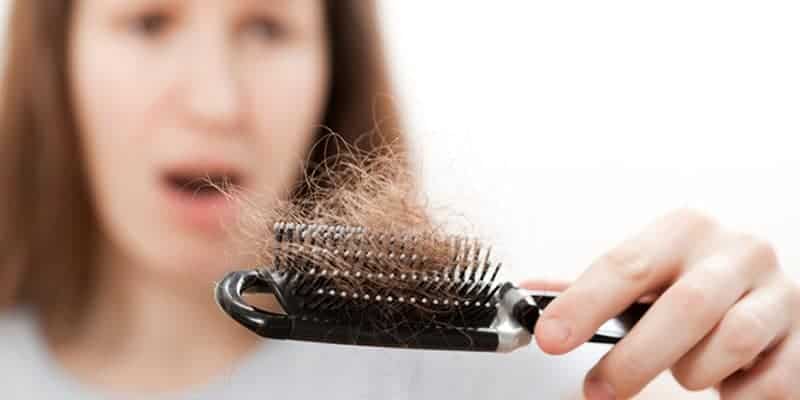People with diabetes are often warned about complications affecting the eyes, fingers, and toes, but hair loss is rarely discussed. Hair thinning or balding can bring feelings of shame, as hair plays a key role in our sense of beauty and identity.
This article will explore the common causes and treatment options for diabetes-related hair loss.

Key Points:
- High blood glucose (sugar) levels can damage blood vessels, leading to hair thinning and loss in people with diabetes.
- Thyroid issues, anemia, and certain autoimmune conditions are common causes of hair loss in people with diabetes.
- Managing blood sugar levels and addressing underlying conditions are key to preventing further hair loss.
- Treatment options include biotin supplements, Rogaine, corticosteroid injections, and platelet-rich plasma (PRP) therapy.
Common causes of hair loss in people with diabetes
High blood glucose levels
High blood sugar can damage small blood vessels, reducing oxygen and nutrient delivery to hair follicles, which causes hair to thin and appear brittle, according to Dr. Raman K. Madan, MD, of Northwell Health.
Thyroid issues
People with diabetes, particularly type 1, should check thyroid levels annually, as thyroid diseases such as hypothyroidism can cause hair shedding.
Proper thyroid treatment, often through medication or dietary changes like a gluten-free diet (according to some research), can help prevent further loss of hair.
Anemia
While not exclusive to diabetes, anemia is a common cause of hair loss. Low iron levels are easily tested and typically treated with supplements. According to the Academy of Nutrition and Dietetics, dietary sources of iron include lean meat, beans, and leafy greens.
Alopecia areata
An autoimmune condition like type 1 diabetes, alopecia causes the body to attack hair follicles, leading to thinning hair on the scalp, eyebrows, and other areas.
Treatment options range from corticosteroids to less aggressive topical treatments like anthralin cream, depending on the severity.
Does metformin cause hair loss?
Long-term use of metformin, a common diabetes medication, can lead to vitamin B-12 deficiency, which may contribute to noticeable hair loss.
Metformin can reduce the body’s ability to absorb B-12, leading to symptoms like fatigue, numbness, and even hair loss.
If you’re taking metformin, your doctor may recommend B-12 supplements, B-12-rich foods, or B-12 injections to prevent or treat deficiency.
Read more about this medication in: Everything You Need to Know About Metformin.
Hair loss treatment in people with diabetes
The best treatment for hair loss in people with diabetes depends on the underlying cause. Several strategies can help prevent further hair loss and promote regrowth.
Blood sugar management
First and foremost, improving your blood sugar levels is essential. Following the American Diabetes Association’s recommendation of an A1c level at or below 7 percent can improve your overall health and prevent complications, including hair loss.
For those who can be more aggressive in managing their blood sugar, aiming for an A1c below 6.5 percent may further reduce damage to both small and large blood vessels.
An A1c of 7 percent corresponds to an average blood sugar level of 154 mg/dL.
Read more in: How to Translate Your A1c to a Blood Sugar Level.
Each person should work with their healthcare team to determine a realistic and safe A1c target.
For example, people with hypoglycemia unawareness may find that an A1c below 6.5 percent increases their risk of dangerously low blood sugars, making a goal closer to 7 percent safer.
Improving blood sugar management isn’t just about correcting high blood sugars — it’s about preventing them through a combination of medication adjustments, reducing processed foods, increasing physical activity, and eating more whole, nutrient-dense foods.
See more in: How to Lower Your A1c: The Complete Guide.
Over-the-counter treatments
Biotin supplements: Biotin and B-complex vitamins may support hair growth, but won’t treat hair loss caused by blood sugar or autoimmune conditions.
Natural food sources of biotin include whole eggs, nuts, salmon, avocado, and cauliflower.
Rogaine (minoxidil): Applied directly to the scalp, Rogaine can help restore hair growth. However, continued use is necessary, and it’s important to speak with a dermatologist to determine the cause of your hair loss.
Hair care tips: Avoid tight hairstyles, chemical relaxers, and harsh treatments like bleaching, as they weaken hair follicles. Opt for natural or organic hair products to reduce damage and allow for healthy hair growth.
More aggressive options
Corticosteroid injections: For autoimmune-related hair loss, injections may reduce hair loss by targeting immune system activity.
Platelet-rich plasma (PRP): This newer treatment uses a person’s own blood plasma to stimulate hair follicle growth.
Hair transplants: Not always a permanent fix, as damaged blood vessels from high blood sugar levels may cause transplants to fail.
Propecia (finasteride): For men only, this medication treats male-pattern baldness by blocking hormone production that causes hair loss.
While managing hair loss can be challenging, taking steps to control blood sugar and exploring appropriate treatments can make a big difference.
Did you find this article helpful? Click Yes or No below to let us know!





debra J Haney
good information , I was asking about the ingredients of Hers and Diabetes type 1?
Belle Mart
It caused thinning of my hair. For a solution I have looked through micro links hair for sale. It helped to conceal my hair loss.
mahtateb
How can I stimulate my hair follicles for hair growth?
Christel Oerum
I can’t help you with that but your doctor might have some ideas
Graciela Sanchez Torres
Which shampoos will you suggest for diabetics?
Christel Oerum
I don’t know that any shampoo is better for people living with diabetes
Maria
I’ve just recently noticed hair thinning and I am prediabetic and its gotten worse near my facial line as. I am working on losing more weight but I’ve already lost 17lbs with diet and exercise. What gives!?
Christel Oerum
As mentioned in the post there can be a lot of different reasons for hair loss. I would reach out to your doctor and have the appropriate tests done so that you know what you’re dealing with. I think that’s the way to find a solution that will actually work for you